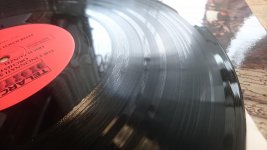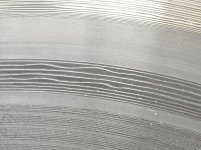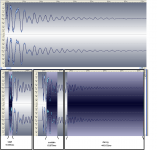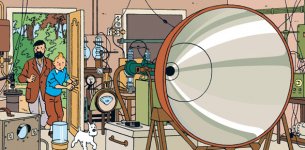At least the phase of a cannon is unambiguous.Someone needs to post a USB microscope photo of the +12dB grove of this on the Telarc Omnidisk.
Had to use the cell phone. I'm not really sure if I got the right location,
there is a lot of such abuse on the disk.
Attachments
Hi Bill,
I'm sure there are some things I haven't fixed. Very few with a handle! That was my rule at my shop. "if it has a carry handle on it, we don't fix it!" Save the Revox R-R machines that is.
Repairing things made in the 20's and 30's is fun. That is pure enjoyment, making something like that come back to life.
-Chris
I'm sure there are some things I haven't fixed. Very few with a handle! That was my rule at my shop. "if it has a carry handle on it, we don't fix it!" Save the Revox R-R machines that is.
Repairing things made in the 20's and 30's is fun. That is pure enjoyment, making something like that come back to life.
-Chris
Hi Tournesol,
-Chris
Wrong assumption. We both listen and measure. The two together keep us on the track of truth where relying on only one generally turns into a sonic disaster! However, if you are not use to test equipment, or don't even have any, I can see how you might form such an opinion. I believe if something doesn't sound good, it needs fixing. That goes for much of the audio equipment "designed by ear", as those "designers" like to point out. Fixing those also tends to make the product reliable at the same time. I'm one of those funny people that believe that everyone should get sound and not smoke when they turn their equipment on. (Notice that it had to be turned on, not been left on "24/7")...they live in a perfect world where everything is under the control of the pure science and don't believe in what they ear.
-Chris
So *you* were not concerned by the sentence you quoted. But tell-me in the name of who are-you talking when you wrote "We" ? I have myself several measuring instruments in my lab, ( but i use my ears when it is about music reproduction, my eyes for photography, my... but this is private.)Hi Tournesol,
Wrong assumption. We both listen and measure.
Attachments
Last edited:
Hi Tournesol,
The "we" I am referring to is any analog design engineer I have ever met. I have yet to see even one (on two continents) who does not subject their work to listening tests before releasing a design to production. True, some may not have that fine an ear, but they do listen to their designs before considering them complete.
The general tone you are taking would suggest you do not work with the aid of electronic, base band test equipment. If you do, why would you make such a familiar comment?
-Chris
The "we" I am referring to is any analog design engineer I have ever met. I have yet to see even one (on two continents) who does not subject their work to listening tests before releasing a design to production. True, some may not have that fine an ear, but they do listen to their designs before considering them complete.
The general tone you are taking would suggest you do not work with the aid of electronic, base band test equipment. If you do, why would you make such a familiar comment?
-Chris
I also do not understand that severe division into two camps.
Google 'pyramid effect'.
Jan
Hi Tournesol,
If you do, why would you make such a familiar comment?
Brand new in this forum, I had read a lot silently.
I was shocked to see so many aggressive messages against some designers, here, who trust what they hear while it looks like some of them have a lot more measuring instruments than average. At the end they prefer to talk of the "sound" ? That what all their work was about.
For me, believing in snake oil or only in measurement numbers is exactly the same approach: a belief.
From the origin of the creation of the musical instruments, choosing the trees, to the loudspeakers in our home, the so calling "HiFi" is a craftmen's business, don't you thing ?
For me, a good craftman is a guy with a good balance between knowledge, experience, taste, sensitivity and spirit of innovation.
As an example, this recent controversy about the sound of resistances.
I had often restored old amps, changing all the carbon resistances by metal film ones, between two adventures with TinTin. Not at all the same sound. Not at all.
I wonder if some can see a huge difference in measurements in the audio range ?
Same thing if you replace electrolytic with film capacitances in all the signal and feedback paths.
If the academy tell-me that is impossible, i am sorry, but i will trust my ears and personal experience more than their words.
If you think I am wrong, forgive-me, I live in a comic strip.
There is generally some strange superstition (kept by pure ojectivists without musical background) that some hifi designers do not make calculations or measure their designs. I also do not understand that severe division into two camps ;-)There is generally some strange superstition (kept by pure subjectivists without technical background) that design engineers do not listen to music and their designs . I also do not understand that severe division into two camps.
Last edited:
It's part of human tribal nature. There are many social divisions and disagreements that bear some semblance to the two prohibited subjects, but usually with much less intensity. Everyone has some tendency to believe they and maybe their group see reality as it truly is, and everybody else is mistaken, or worse, intentionally deceitful. The tendency is called naive realism, Naive realism (psychology - Wikipedia)...also do not understand that severe division into two camps.
Of course, those of us who study physics and engineering *know* we actually do see the world as it really is.

EDIT: To go on a bit with the story, once it is believed that someone is not mistaken, perhaps because we have explained reality to them but they still insist on their version, it may seem they are being intentionally deceitful. It isn't much more of a leap to decide the other guy must be evil.
Last edited:
A far more compelling theory is that the security of hiding behind a keyboard brings out the worst in a lot of people. But as Pavel says, I've never met an audio designer who doesn't love music. Otherwise why would they be involved in a cut throat industry that's been dying (according to the media) for 30 years now?
Hiding behind a keyboard is linked with what I said, not at odds IMHO, it makes jumping to conclusions about others tend to be more negative. There is no tone of voice, no facial expressions, no mitigating subtle friendly signals that people use to communicate in person. Words may be read between the lines as harboring negative attitudes and intentions.
Add to that that humans tend to be risk averse, its safer to assume the worst than the best from strangers. Probably some survival advantage to that in our ancestors.
Add to that that humans tend to be risk averse, its safer to assume the worst than the best from strangers. Probably some survival advantage to that in our ancestors.
We are not risk averse though. Taking risks IS a survival strategy. If we were risk averse casinos wouldn't exist and A&E would be a lot emptier and we probably wouldn't have made it out of africa as a species.
We might also have less arguments about the goat paradox as well
We might also have less arguments about the goat paradox as well
Risk averse is a statistical tendency, not something that happens every time.
Also, people with a gambling problem don't think they are taking risk, they think there is a way to beat the game and that they know what that way is.
People may have left Africa when there was a drought or overpopulation.
Of course, there are few explorers, but they tend to think they can probably handle any risks that may arise. Overconfidence bias sometimes plays a role in risk taking, people can mis-estimate how much risk there may be. Same kind of thing with forming a start up company. Everyone knows that most of them fail, but everybody thinks theirs is highly likely to succeed.
As always, people are extremely complex, but we do know some statistical things about them. Of course, people tend to think that statistics don't apply to them, and they can give a list of reasons why, even if they are in the exact class studied, and even if they are told everyone in the class thinks the class statistics don't apply to them.
Also, people with a gambling problem don't think they are taking risk, they think there is a way to beat the game and that they know what that way is.
People may have left Africa when there was a drought or overpopulation.
Of course, there are few explorers, but they tend to think they can probably handle any risks that may arise. Overconfidence bias sometimes plays a role in risk taking, people can mis-estimate how much risk there may be. Same kind of thing with forming a start up company. Everyone knows that most of them fail, but everybody thinks theirs is highly likely to succeed.
As always, people are extremely complex, but we do know some statistical things about them. Of course, people tend to think that statistics don't apply to them, and they can give a list of reasons why, even if they are in the exact class studied, and even if they are told everyone in the class thinks the class statistics don't apply to them.
Last edited:
Add to that that humans tend to be risk averse, its safer to assume the worst than the best from strangers.
Like people that cheat the casinos, it only takes a few body language or other cues to decide one way or the other about people. It has served me welI, not perfect but usually it works out, in some cases exceptionally well. My wife has always commented on my tolerance for extremely eccentric people, it just goes with the musical tastes.
Last edited:
Mark: I don't agree with your view on this, but accept that there is academic debate on this. I think you are also picking extreme examples to bolster your viewpoint. Risk doesn't have to be dangerous in itself.
A number of the current leading theories on why we left Africa suggest it was just done because they could. Whole family units heading off to see what was there. Of course time will likely see these theories replaced with others, but for now and with the (albeit limited) evidence I have seen I'd need some persuading.
A number of the current leading theories on why we left Africa suggest it was just done because they could. Whole family units heading off to see what was there. Of course time will likely see these theories replaced with others, but for now and with the (albeit limited) evidence I have seen I'd need some persuading.
- Status
- Not open for further replies.
- Home
- Member Areas
- The Lounge
- John Curl's Blowtorch preamplifier part II




